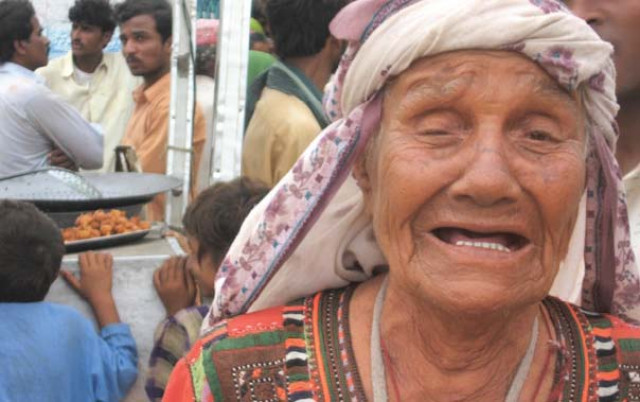Women in IDP camps sleep on empty stomachs
.

Her family, originally from the Bajaur Agency, has been living with an uncle in Kohat since early in 2009 following clashes between the army and Taliban militants, reports IRIN, the UN information unit. Sometimes there is almost nothing left to eat but the women are used to it.
Nasreena and her mother help her aunt cook for the 14 people living in the four-room house. But, like the other girls and women, she only eats a tiny fraction of what she prepares. “This pattern is common in many homes. Women and girls get less to eat, as they are considered to need less food than men,” said Aisha Bibi, a 40-year-old health worker.
“We try to educate people about the risks if expecting mothers, or girls who will one day become mothers, do not get enough to eat.” Some 12 per cent of children screened in displaced families, and their hosts, suffer from moderate or acute malnutrition.
Girls make up 58 percent of those affected, according to a report by the UN Office for the Coordination of Humanitarian Affairs (OCHA).
More than 500,000 children are believed to have been displaced throughout Pakistan, according OCHA. According to a report published by OCHA in December 2009, some 130,000 children were displaced from South Waziristan alone since October 2009.
In total, about 2.2 million people have been rooted from their homes since October 2008, according to the UN. More than 1.2 million of these Internally Displaced Persons (IDPs) decided to lodge with their relatives.
While many have returned to their homes, others continue to remain with their relatives until the situation in their home districts improves. Bibi said there was a “strained food situation” in the homes of the hosts supporting IDPs for many months now.
“This could also be adding to the malnutrition,” she said. According to official government data, 13 per cent of the people living in conflict-affected NWFP and the Federally Administered Tribal Areas suffer from malnutrition. “I know I need to eat well. Doctors I saw at the Jalozai Camp in Nowshera, where we lived for a short time, told me I needed better food. But how can we get it? Whenever we have an egg or two at hand I cook them for my husband, because he must do hard work as a labourer,” said Haseeba Bibi, 35, an IDP from the Orakzai Agency who recently gave birth to her third child.
She is currently based with a host family just outside Kohat. “We are too poor to care for our welfare, and people at home, who stayed on in the conflict zone, are even worse off,” she added. That said, a number of humanitarian agencies have been targeting the malnutrition problem in these affected areas. Some of these areas have even begun to show improvements.
There are some 6,179 pregnant or lactating women and 15,036 children are enrolled in a supplementary feeding programme run by humanitarian agencies, according to OCHA. “At the start of 2009 the rate of acute malnutrition in the IDP camps was around 17 per cent, but by the end of the year it was around 11 percent,” Muhammad Rafiq, programme specialist at the Peshawar office of the United Nations’ Children’s Fund (UNICEF), said.
“This improvement can be attributed to an effort made to provide general food distribution, therapeutic and supplementary nutrition interventions, safe water supply and enhanced health and sanitation services in the IDP camps and affected communities,” he added.
Rafiq said UNICEF, with collaboration of health department in NWFP and other NGO partners, was also conducting community-based programmes that addressed acute malnutrition in children under five and pregnant and lactating women.
“The programme is addressing micronutrient malnutrition through the provision of multiple micronutrient sprinkles to children and tablets to pregnant women and feeding mothers. We are also deworming these patients and giving them vitamin A supplementation,” Rafiq added.
Rehman, a 23-year-old student from Kohat University of Science and Technology feels that feeding the people alone is not enough. “Our problems come more from lack of education than food,” he said.
“Our women and children will continue to suffer from malnutrition even when things turn back to normal,” he added. “These food programmes are all well and good but we also need educate the masses to bring about a permanent change.”



















COMMENTS
Comments are moderated and generally will be posted if they are on-topic and not abusive.
For more information, please see our Comments FAQ